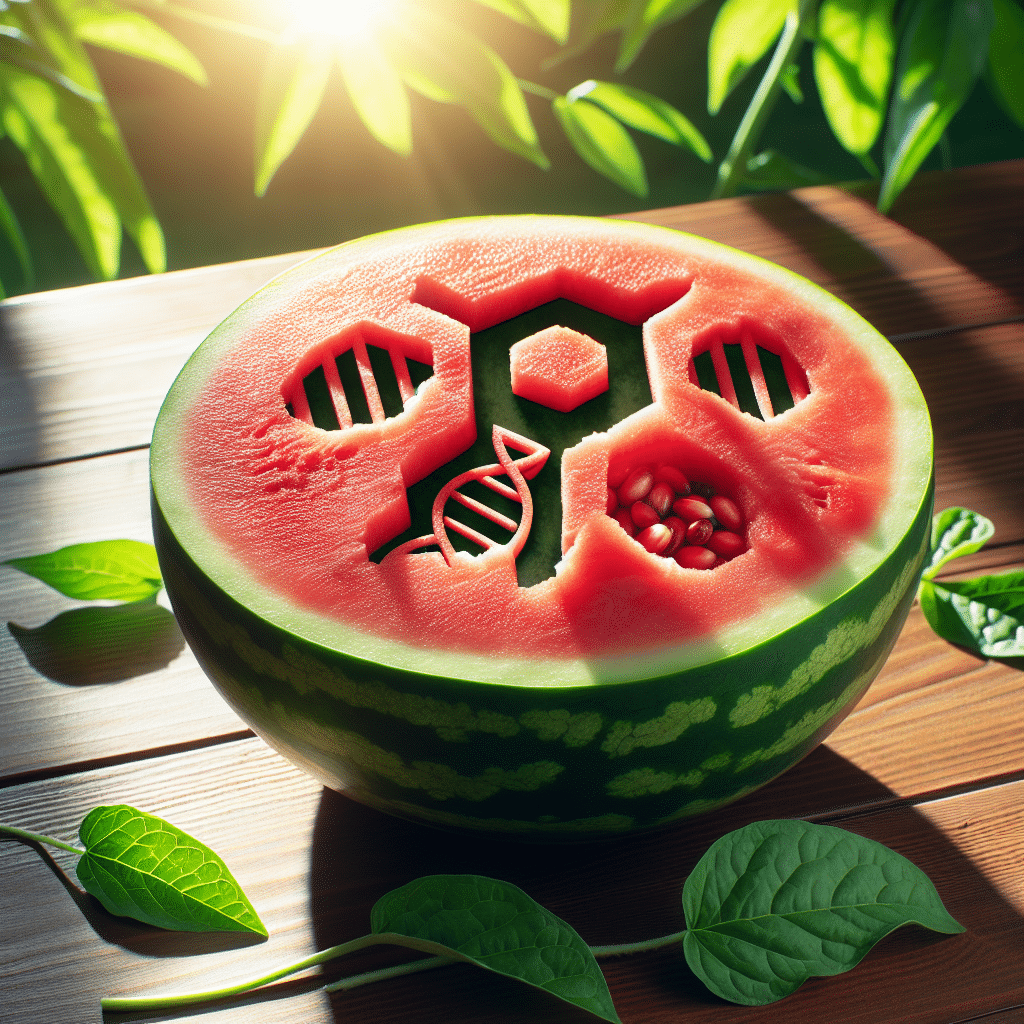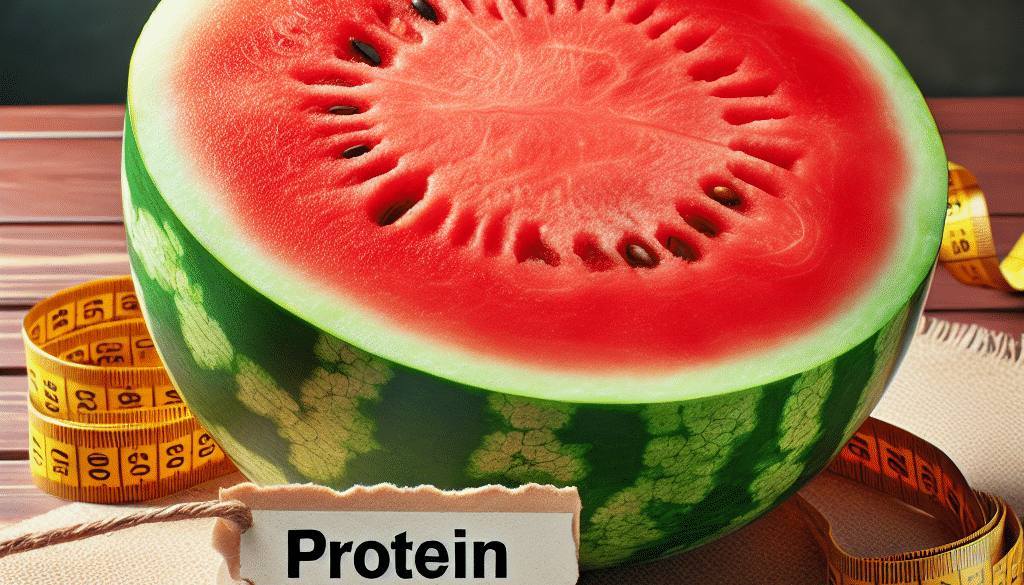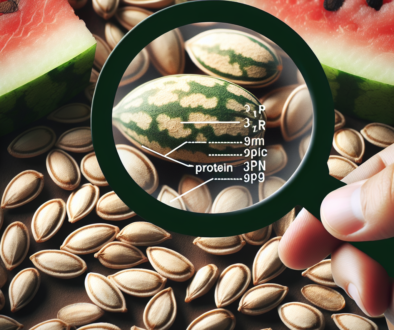Is Watermelon A Source Of Protein?
-
Table of Contents
- Watermelon as a Protein Source: Unveiling the Nutritional Facts
- Understanding Protein in Watermelon
- Comparing Watermelon to Other Protein Sources
- Watermelon in a Balanced Diet
- Maximizing Protein Intake with Watermelon
- Case Studies and Research
- Conclusion: Watermelon as a Protein Source
- Discover ETprotein’s High-Quality Protein Products
Watermelon as a Protein Source: Unveiling the Nutritional Facts

Watermelon is a refreshing and hydrating fruit that is often associated with summer picnics and beach outings. Its sweet, juicy flesh is not only delicious but also packed with vitamins and minerals. However, when it comes to protein content, many people are curious about whether watermelon can be considered a source of this essential macronutrient. In this article, we will explore the protein content of watermelon, compare it to other protein sources, and discuss its role in a balanced diet.
Understanding Protein in Watermelon
Protein is a vital component of every cell in the body and is essential for building and repairing tissues, making enzymes and hormones, and supporting immune function. While watermelon is not typically recognized for its protein content, it does contain small amounts of this nutrient.
- Protein Content: A standard serving of watermelon (about 2 cups or 280 grams) contains approximately 1.1 grams of protein.
- Amino Acid Profile: Watermelon provides all the essential amino acids, but in very low quantities.
- Protein Quality: The protein in watermelon is not considered a complete protein source due to its low levels of some essential amino acids.
Comparing Watermelon to Other Protein Sources
When compared to other common protein sources, watermelon falls short in terms of protein density. For example:
- Animal Proteins: Chicken, beef, and fish are high in protein, offering between 20 to 30 grams per 100-gram serving.
- Plant-Based Proteins: Legumes like lentils and chickpeas contain about 9 grams of protein per 100 grams, while nuts and seeds can offer between 15 to 25 grams per 100 grams.
- Dairy: A cup of milk provides around 8 grams of protein, and a single slice of cheese can have up to 7 grams.
Clearly, watermelon is not a significant source of protein, especially when compared to these other foods.
Watermelon in a Balanced Diet
Despite its low protein content, watermelon has a place in a balanced diet due to its other nutritional benefits:
- Hydration: Watermelon is over 90% water, making it excellent for hydration.
- Vitamins and Minerals: It is a good source of vitamin C, vitamin A, potassium, and other nutrients.
- Antioxidants: Watermelon contains antioxidants like lycopene and cucurbitacin E, which have various health benefits.
While watermelon should not be relied upon as a primary protein source, it can complement a diet that includes adequate protein from other foods.
Maximizing Protein Intake with Watermelon
For those looking to increase their protein intake while enjoying watermelon, consider the following tips:
- Pairing: Combine watermelon with high-protein foods such as Greek yogurt, cottage cheese, or nuts.
- Smoothies: Add watermelon to protein-rich smoothies that include whey or plant-based protein powders.
- Salads: Top watermelon salads with grilled chicken, tofu, or feta cheese for a protein boost.
Case Studies and Research
Research on watermelon’s health benefits often focuses on its hydrating properties and antioxidant content. Studies have shown that watermelon can help reduce muscle soreness and improve recovery after exercise, although this is not directly related to its protein content.
One study published in the “Journal of Agricultural and Food Chemistry” found that watermelon juice helped to reduce muscle soreness and heart rate recovery in athletes. However, it’s important to note that these effects are likely due to the amino acid L-citrulline and other nutrients in watermelon, rather than its protein content.
Conclusion: Watermelon as a Protein Source
In conclusion, while watermelon does contain protein, it is not a significant source of this nutrient. Watermelon should be viewed as a hydrating fruit with various health benefits rather than a staple for protein intake. For those looking to increase their protein consumption, it is advisable to include a variety of other protein-rich foods in their diet.
The key takeaways from this article are:
- Watermelon contains a small amount of protein, approximately 1.1 grams per 2 cups serving.
- It is not a complete protein source and should not be relied upon for meeting daily protein needs.
- Watermelon can be part of a balanced diet and offers hydration, vitamins, minerals, and antioxidants.
- To increase protein intake, pair watermelon with other protein-rich foods.
Discover ETprotein’s High-Quality Protein Products
If you’re looking for reliable sources of protein to complement your diet, consider ETprotein’s range of organic bulk vegan proteins. ETprotein offers a variety of plant-based protein options, including watermelon seed protein, which can be an excellent addition to your nutritional regimen. Their products are characterized by a neutral taste, non-GMO, allergen-free attributes, and high purity levels, making them suitable for various industries and dietary preferences.
For those interested in exploring alternative protein sources, ETprotein’s watermelon seed protein is a noteworthy option. It provides a plant-based protein solution that can be easily incorporated into your diet. To learn more about ETprotein’s offerings or to sample their products, please contact them at sales(at)ETprotein.com today.
About ETprotein:
ETprotein, a reputable protein and L-(+)-Ergothioneine (EGT) Chinese factory manufacturer and supplier, is renowned for producing, stocking, exporting, and delivering the highest quality organic bulk vegan proteins and L-(+)-Ergothioneine. They include Organic rice protein, clear rice protein, pea protein, clear pea protein, watermelon seed protein, pumpkin seed protein, sunflower seed protein, mung bean protein, peanut protein, and L-(+)-Ergothioneine EGT Pharmaceutical grade, L-(+)-Ergothioneine EGT food grade, L-(+)-Ergothioneine EGT cosmetic grade, L-(+)-Ergothioneine EGT reference grade and L-(+)-Ergothioneine EGT standard. Their offerings, characterized by a neutral taste, non-GMO, allergen-free attributes, with L-(+)-Ergothioneine purity over 98%, 99%, cater to a diverse range of industries. They serve nutraceutical, pharmaceutical, cosmeceutical, veterinary, as well as food and beverage finished product distributors, traders, and manufacturers across Europe, USA, Canada, Australia, Thailand, Japan, Korea, Brazil, and Chile, among others.
ETprotein specialization includes exporting and delivering tailor-made protein powder and finished nutritional supplements. Their extensive product range covers sectors like Food and Beverage, Sports Nutrition, Weight Management, Dietary Supplements, Health and Wellness Products, and Infant Formula, ensuring comprehensive solutions to meet all your protein needs.
As a trusted company by leading global food and beverage brands and Fortune 500 companies, ETprotein reinforces China’s reputation in the global arena. For more information or to sample their products, please contact them and email sales(at)ETprotein.com today.














